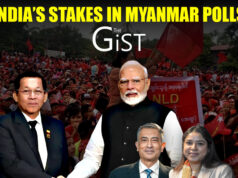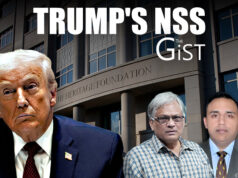NEW DELHI: On ‘The Gist‘, Ambassador Thomas Pickering, Former U.S. Under Secretary of State for Political Affairs, the third highest post in the State Department, Ex-Envoy to the United Nations, the Russian Federation, India, Israel, and Jordan in conversation with StratNews Global Associate Editor Amitabh P. Revi.
Editor’s Note: These are quotes edited for space, understanding and conciseness. For the whole context, watch the complete discussion.
Current Ukraine Situation
Complex and confused captures the situation, but diplomacy always has its interesting and continuing undercurrents. Three defining issues. One, Mr. Putin is on a fine-balancing act between the combination of threats and assessments that in one way or another, are intended to both lead people on in his favor and push the other side —the U.S. and NATO. Second is the continuing uncertainties about what he is going to do. Third, the question of the ongoing Olympic Games and his interest in having a close relationship with the People’s Republic of China in Beijing. As a result, in a sense, we have a bit of a respite for diplomacy, being conducted by many people in many ways. And to some extent, that confusion upsets an ability to understand whether there is now a useful track and a useful series of possible objectives and possible work-outs.
Western alliance central to pushback
Alliance unity is central, because it is the major and most important pushback against the aggressive portions of what President Putin is presenting as the Russian position. But, the methods for reaching agreement were not born with the birth of the alliance, with no hard work to put it in place. So, there is diplomacy within the Alliance that is very significant. My sense is that the deeper the threats from Mr. Putin, the more likely there is to be solid agreement among the alliance as to how to deal with it.
Threat to shut Nord Stream pipeline
How could President Biden deal with Nord Stream? It runs through the high seas, seabed for a long distance in the Baltic. So, one would know and understand that that portion is under German control — is within the German economic zone, in the sea, and within German territorial waters. Hopefully, any action against Nord Stream, because of the violence of Russian action, would secure Germany’s support and that was the hope yesterday. Chancellor Scholz was helpful, but not conclusive, in his support of Mr. Biden. But, we will see they will continue to work on this. One can imagine there will be a point beyond which German interest in a diplomatic answer fades away in response to the seriousness of the violence and the use of force by Russia, which we of course, hope never happens.
NATO not ready to expand to Ukraine?
There has been a fervid adherence to the primacy of diplomacy. We have seen it from President Biden, President Putin, Chancellor Scholz, President Macron and others. It’s important to continue to converse. Diplomacy doesn’t happen overnight. It’s not instant coffee. It takes a lot of hard work, a series of unfolding contexts, and the development of ideas that might help bridge the gap. One of those ideas is an idea that you’ve raised, that not all NATO members are yet ready to sponsor the expansion of NATO to Ukraine and Georgia. That might take a great deal of time, if at all. In any event that means in effect, that while NATO, and I believe this to be true, is not at all interested in taking a self denying ordinance about expansion. The reality may well be that NATO expansion is not likely to happen because it requires unanimity of NATO members, something that is not present, and which doesn’t look like it will be present for some time. However, the more President Putin pushes the use of force and the build up of his troops and equipment in and around Ukraine, the more likely it is to become that those states in the region, members of NATO will feel the threat because it isn’t limited only to Ukraine. What happens in Ukraine could have damaging effects elsewhere. And therefore NATO will come together much more in terms of its absolute requirement to defend all of its members, if they are attacked either inadvertently indirectly or directly.
India’s UN vote abstention & Ukraine statements
Having served as Ambassador for a time in the mid 90s in India and understanding the history of Indian foreign relations and the strong affinity for India to the Bandung principles, non alignment and a deep sense of commitment to diplomacy, the statements made by the Indian representative to the United Nations, characterize that smack-on and that’s important. I would think President Biden should be grateful, even though India did not join in the Security Council resolution—they abstained—for the support for the diplomatic workout, which President Biden constantly repeats and reiterates as the centerpiece of the American approach on how to treat the problem in Ukraine.
Potential military conflict
How the U.S. would treat that problem would, in very large measure, depend upon what President Biden meant when he talked about tanks and foot soldiers crossing the Russia-Ukraine border, perhaps into the region now occupied by the two separatist Oblasts(regions) and their Russian supporters. We have to wait and see what that means. I think President Biden is being extremely serious about the degree to which he has emphasised the significant importance of any use of force to deal with this problem by Russa. But, he has also been very clear that he has no intention of sending U.S. forces to Ukraine, only to the NATO allies in the region, who have asked for additional forces from NATO and where it is quite appropriate given the threats to the region I that the U.S. and the other NATO partners play a role in increasing their presence. But, he has emphasised that that presence is a defensive presence. And he’s there for the purpose of the Alliance, which is defensive.
No CAATSA waiver on S-400?
That indeed might take place, although one would hope there would be an understanding in India that any unprovoked Russian use of military force, any unprovoked Russian aggression, would constitute a violation of Russia’s obligations under the UN Charter and indeed a violation of international law of the most extreme kind. We have seen in the past, the United Nations come together. They cannot do so in the Security Council as long as there is a Russian veto present. But, they might come together around other organisations and other approaches, we can only speculate. The U.S. would, I think, strongly hope both for Indian understanding and wherever possible Indian support, particularly Indian support for a continued approach that uses diplomatic settlement as the principle tool for resolving the problem. We are not at the point, I believe, where the problem itself is ripe for any kind of military action. We have not exhausted all of the diplomatic endeavours that will take quite a bit of time and quite a bit of effort. But, what we are seeing now is Russia’s interest in using the military presence there as an effort to perhaps influence or leverage others in a direction that is favourable to Russia’s approach, whatever that might be in the long run. That will be something that India and other countries in the region, that have had traditionally strong relations with Russia, will clearly want to take into account.
Russia-China partnership & differences
It’s a very important question. The Russia-China relationship extends back in history to the Second World War and before, so what’s happening now and pushing Russia and China together may well be a conclusion. On the other hand, it is very clear to me that Chinese interest in becoming involved in a war in Ukraine has to be quite limited by Chinese interest in producing around the world strong support for China for economic development, for the Belt and Road proposal, for China’s interest in becoming the world’s leading or perhaps a leading economic player. And certainly in the whole question of multipolar solutions to world problems, not unipolar solutions to world problems, which is sort of where the Russians seem, at the moment, to be interested in taking us. We have to be concerned about that. So the question here obviously is—is there a Russia-China relationship that will overcome the differences? The differences begin perhaps among the two on who is the leader. That was something that split Stalin and Chairman Mao years ago, and led to violence on the Russia-China border in the mid 60s and led to a period of differences between Russia and China that hasn’t been fully resolved. There are differences as well in terms of territorial questions that go back into the 17th, 18th and 19th century in Eastern Siberia and northeastern China. There are differences on interdependence. How much should China become dependent or widely dependent on Russian oil and gas and Russian military supplies? How should Russia parse that out, particularly on military supplies, where the tendency seems to have been that Russia will provide China with up-to-date military equipment, but perhaps not the most up-to-date military equipment. And where over a period of years, Russia’s preoccupation with China and the China border has led Russia to insist that it must retain tactical nuclear weapons, and that a significant share of those seem to be oriented in their tactical configuration toward the Russia-China border, because Russia does not have manpower resources in Siberia, sufficient to offset the very large Chinese population on the other side of the border in northeastern China.
Focus shifting away from constraining China?
We have to deal with the world as it is not as we would wish it to be. Any country that felt China was a problem would wish it to not be a problem. And if it doesn’t go away, not to have other competing problems to deal with. But the United States is a country of certain size, dimensions, facilities, capabilities, assets and resources, and as a result has to configure itself in a realistic way to deal with the world as it exists. The U.S. has been very interested in speaking with China on a regular basis, and seeing what it can do, both through a combination of economic pressure, as well as openings for future cooperation with China that can, one way or another, begin to build a relationship, which is neither all opposition or all in one way or another followership for China. Climate change is one of those areas where an effort to build a common relationship seemingly has taken a big hold and has an important role. Russia, China and the United States share a common appreciation of energy needs, and indeed the importance of energy and the need to, in one way or another, calculate how energy development is going to affect things like climate change.




